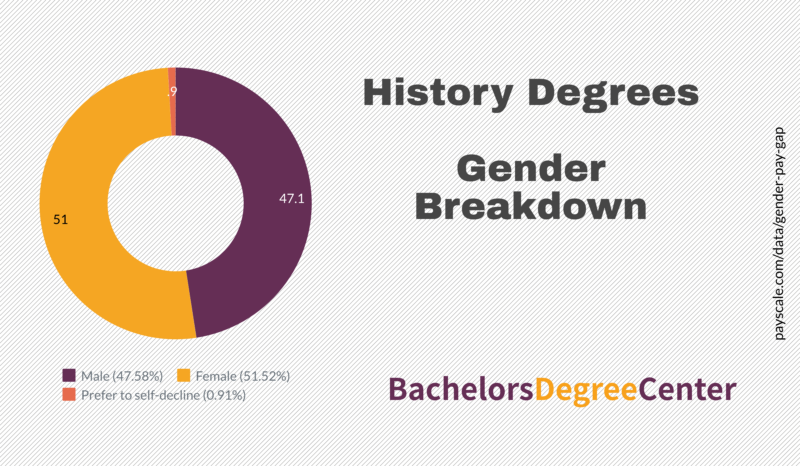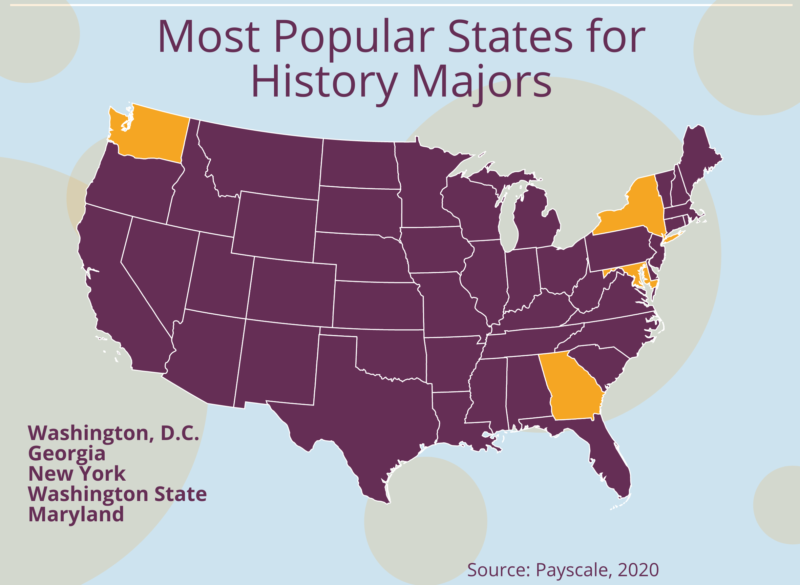Key Information:
- A history degree offers diverse career paths, including education, law, public history, and more.
- Graduates develop strong research, writing, and critical thinking skills.
- Students can focus on various areas such as American history, European history, military history, and more, tailoring their studies to specific interests.
- The degree emphasizes analytical skills, historical research methods, and the ability to interpret complex data.
The study of historical facts and history is the study of events of the past through what has been written and communicated through the written word.
However, the study of history is not strict memorization of dates and events, but the exploration of the cause and effect of events over time – with the ultimate goal of gathering & interpreting incongruent (at least on face) information in the creation of a solitary coherent event. Given the above definition of the study of history and an interest in a history degree, it is critical for you to answer the question – Why should I get a history degree?

Why Get a History Degree?
The reality is a history degree refines your attention to detail and ability to synthesize skills while honing your research skills. In combination, the skills learned by earning a baccalaureate degree in history prepares graduates for a career in the research sector, academia, and public relations, to name a few.
School/Program Accreditation
Accreditation is the standardized procedure in which oversight-sanctioned organizations are tasked with the responsibility of evaluating both academic facilities (professional schools, colleges, and universities) and the degree programs they offer. Schools and programs are evaluated based on predetermined criteria either established by government experts or industry officials.
Ultimately, the concept of accreditation has been designed to accomplish the following -
- Develop & improve the overall academic quality of the nation’s education systems.
- Protect the public by holding professional schools, universities, and colleges accountable as to the programs and education they offer and advertise.
In the United States (US), there are two primary levels of accreditation – Regional Accreditation and Specialized Accreditation. The oldest of the accreditation processes is that which is administered by the federal government, as noted by CHEA — the Council for Higher Education Accreditation (CHEA). This is discussed next.
Regional Accreditation
The United States Department of Education is organized into six regional agencies that manage the regional accreditation process through the United States’ divided regions, which review entire institutions. Each federal, regional agency is responsible for administering the accreditation processes to those higher learning institutions located in its region.
Regional accreditation embodies quality education by assessing the curriculum, the educator’s credentials of educators, and, thus, the validity/credibility of these degrees.
- The Higher Learning Commission (HLC)
- Northwest Commission on Colleges & Universities (NWCCU)
- Southern Association of Colleges & Schools Commission on Colleges (SACSCOC)
- Middle States Commission of Higher Education (MSCHE)
- WASC Senior College & University Commission (WSCUC)
- New England Commission on Higher Education (NECHE)
In addition, schools and programs related to specific industries have the option to voluntarily open their facilities and programs to the scrutiny and evaluation of specialized accreditation agencies – sanctioned specifically by industry personnel.
In the field of history, there are no specific accrediting agencies, so the most prudent way to determine which accredited online history degree would be to consider the quality of some of the best colleges for a history degree offered on-campus and online.
As such, when determining the best history degree colleges and universities, it is imperative that you make your school/program choice based on an online history degree accredited regionally, not nationally. The best colleges for a history degree (including the best online degree programs) will proudly denote its regional accreditation status.
Simply put, if you want to pursue a more advanced degree, it is critical that you choose from those schools that offer accredited online degrees in history.
Types of History Degrees
Anyone who has studied for or has a history degree will tell you that much of the content explores topics that overlap with many different fields and industries. Because of such tremendous overlap, earning one of the many accredited, quality online history degrees available will likely open the door to various careers.
First, it is important to note when studying for your online bachelor’s degree in history; you will gain these skills:
- Professional communication skills.
- Academic research and cross-reference skills are critical to earning an online degree in history.
- Analysis and critical evaluation as to the reliability of historical sources.
- In-depth knowledge of political/historical movements.
- Self-management skills.
- Construct logical arguments in the proper context.
- Cultural sensitivity and tolerance skills.
So, if you are truly serious about finishing your bachelor’s in history online or through a hybrid delivery, consider these options available with an online degree in history.

Online Bachelor’s Degree in History
Most online history degrees require the completion of 120-semester credits, which can be completed in about four years, carrying a full-time course load. Some of the coursework typically included in a baccalaureate history degree curriculum includes –
- Methodologies & Techniques in Historical Research.
- United States History.
- Geography.
- World History.
- Historiography.
- Plus, a significant amount of reading and writing, including a capstone project or senior thesis, is generally mandated for most online history degrees.
In addition, undergraduate degree candidates for an online degree in history can begin to focus on a specific part of the world/time in history/historical perspective that is of most interest or offers you the most inspiration.
While teaching is often the most common career objective for those who earn an on-campus or online degree in history, many find their skills and knowledge can often be leveraged to excel in a career as –
- A Journalist.
- A Librarian.
- A Civil Servant.
- A Criminal Justice Advocate.
- A Policymaker.
- A Politician.
- Researcher.
- A Lawyer, among many other options.
It is worthy to note that those interested in studying history choose to earn a dual degree with a related field. So, if you have a true interest in education but wish to enroll in one of the quality, accredited online history degrees, it may behoove you to consider earning a dual degree with an education component. Dual degree programs typically offer a time-saving, streamlined approach, which will also prepare you to earn your teaching credentials at the same time.
Certifications/Licenses
In the field of history, the value of history certificate programs will depend on the student’s ultimate career goal. The requirements for licenses or history certificate programs online will be contingent on the sister discipline chosen.
For example, if you choose a career in education, it would be more important to earn your teaching credentials to enroll in one of the available online history certificate programs. If you have chosen to pursue a legal career and practice law as an attorney with an online history degree, you will be required to complete your JD (Juris Prudence) degree, pass the Bar, and be approved by the relevant committee.
And for pure historians, the most important degree to pursue would be a doctorate or Ph.D. as that is all that is required to be eligible to become a university professor or publish in peer-reviewed journals.
Job Prospects with a History Degree
As previously noted, an undergraduate history degree is a springboard degree that opens a number of career options. Before you decide on which school or program will meet your needs, be sure to have answered these questions –
- What job can you get with a history degree at the bachelor’s level?
- What career can I do with a history degree earned online?
- Are there jobs with a history degree that are located within commuting distance?
- What jobs can you get with a history degree in the field of library science?
- Where can I find a list of careers in history field that would meet my interests?
- What jobs can I get with a degree in history that can be done remotely?
- What jobs can you get with a history degree in archiving?
- What job can I get with a degree in history if I double major in education? Political Science?
- What job can you get with a history degree that includes writing and research?

Common Jobs You Can Get with a History Degree
Most of the jobs you can get with a history degree include a variety of opportunities. Here is a list, in part, of the jobs that you can get with a history degree –
- High School History Teacher/Educator – most public-school teachers need only earn their teaching credentials, which is considered among the best jobs with a history degree.
- University/College Professor – becoming a college professor is one of the most stereotypical jobs with a degree in history. Note, however, these jobs you can get with a history degree generally require more advanced degrees, i.e., a graduate or doctoral level degree.
- Historian/Archivist – Historians are one of the many jobs you can get with a degree in history that are available in many businesses, private to government. These jobs with a history degree are ideal for individuals with strong analytical skills that are researched oriented.
- Librarian — librarians are one of the jobs you can get with a degree in history – especially for those with a passion for history and libraries. These jobs with a degree in history are suitable for booklovers, researchers, and those who enjoy assisting others in research or reading.
- Museum Curator – many museum curators, find that these are perfect when wondering what jobs can you get with a degree in history. Museum curators typically have a history educational background.
- Translator/Interpreter — when considering what jobs that you can get with a history degree, be sure to consider that of a translator if you enjoy foreign cultures and love languages.
- Writer/Journalist — writing is one of the many available jobs with a history degree that opens up vast opportunities. As a refined communicator, history majors often participate in journalistic pursuits and web content development. These jobs with a degree in history could mean anything from authoring books to journalism to web content development.
- Editor – a history major is adept at research and analysis, which pair well with the skills required to be a strong editor.
- Attorney — attorneys, are quite adept at research, which pairs well with the skills developed by history majors. Although being an attorney answers the question – What jobs can you get with a history degree? — it also requires additional education and licensing by the American Bar Association.
- Human Resource Specialist – professionals working in human resources hail from a variety of backgrounds; however, research and analytical skills are ideal for this position.
- Market Research Analyst – history majors have honed research and analysis skills that help study/predict demographic and economic trends. These skills often help reveal insightful data to help make a company or product more profitable.
In addition, history degree majors have the skills to pursue careers as –
- Political Advisor
- Financial Researchers
- Diplomat
- History Lecturer
- Historical Consultant
- Library Technicians
- Social Workers
- Media and Communications
What is the Salary for History Teachers?
AS the most popular of careers for history majors, the following data from the Bureau of Labor Statistics (BLS) denotes this data relevant to history teacher salaries. According to the BLS, the average history teacher salary at the high school level is as follows –
The median salary for a history teacher (high school) in the United States was $65,220 per year.
The salary for history teachers in the states with the highest wage include the following –
| The top Paying States for High School Teachers | History Teacher Salaries |
| New York | $87,240 per year |
| California | $85,080 per year |
| Massachusetts | $81,070 per year |
| Connecticut | $78,540 per year |
| New Jersey | $78,090 per year |
The salary for history teachers in the states with the highest employment levels include the following –
| States With the Highest Employment Levels of High School Teachers | Number of Teachers | History Teacher Salaries |
| California | 109,840 | $105,540 per year |
| Texas | 107,190 | $64,120 per year |
| New York | 73,360 | $96,400 per year |
| Illinois | 50,640 | $80,200 per year |
| Ohio | 47,510 | $76.070 per year |
The salary for a history teacher in the metropolitan areas with the highest wage include the following –
| Metropolitan Areas with the Highest Salary of a Teacher | Salary for a History Teacher |
| Los Angeles, Long Beach, Anaheim CA | $104,840 per year |
| Chicago, Naperville, Elgin, IL | $84,960 per year |
| Boston, Cambridge, MA | $88,910 per year |
| El Centro, CA | $90,970 per year |
| NY – NJ — PA | $99,400 per year |
In addition, the Bureau of Labor Statistics also reveals the following data regarding history teacher salaries at the post-secondary level – i.e., educators teaching in professional schools, universities or colleges -
| Post-Secondary Teachers | 9% — much faster than average | $82,140 per year |
The salary for history teachers in those states with the highest wages include the following –
| The top Paying States for Post-Secondary Teachers | Post-Secondary History Teacher Salaries |
| California | $117,870 per year |
| Rhode Island | $113,790 per year |
| District of Columbia | $113,770 per year |
| New York | $101,100 per year |
| Massachusetts | $100,700 per year |
What is the salary of a historian?
The average salary for a historian or those who hold a degree in history vary significantly based on the selected career field and the exact position chosen.
Consider these available history degree careers and salaries –
| History Degree Careers and Salaries | Project Job Growth Rate thru 2029 | Historian Salary |
| Archivists/Curators | 11% — much faster than average | $49,850 per year |
| Librarians | 5% — faster than average | $59,500 per year |
| News writers and Journalists | Not Available | $46,270 per year |
| Editors | - 7% | $61,370 per year |
| Market Research Analysts | 18% ‑4x+ as fast as average | $63,790 per year |
| Human Resource Specialists | 7% — much faster than average | $61,920 per year |
| Social Worker | 13% — much faster than average | $50,470 per year |
| Public Relations Specialist | 7% — much faster than average | $61,150 per year |
Historian Salary Options with a Master’s Degree
The federal government’s statisticians at the Bureau of Labor Statistics note that there were more than 3,500 professional historians in the country, with an average salary of a historian to be $72,890. It is noted that these statistics are for those historian salary professionals with a master’s degree.
| History Degree Careers and Salaries – Master’s Level | Project Job Growth Rate thru 2029 | Historian Salary |
| Political Scientists | 6% — faster than average | $122,220 per year |
| Lawyers | 4% — as fast as average | $122,960 per year |

Professional Organizations for History Majors & Professionals
The American Historical Association (AHA)
The American Historical Association (AHA) was founded in 1884 and is recognized as the oldest of all membership organizations dedicated to historians in the nation. The American Historical Association was developed with these objectives –
- Preserve and protect priceless documents.
- Promote historical studies and professionalism.
- Publish Annual Reviews/Perspectives on History.
- Offer a Renowned Annual Conference.
- Develop ethical standards and best standards for teaching history and historical policy.
The American Historical Association boasts more than 13,00 members across the country with noteworthy access to resources, fellowships, and mentors, among others.
The World History Association (WHA)
Established in the early 1980s, the World History Association (WHA) was developed to promote the global, cross-cultural study of world history. Membership in the World History Association hails from all over the globe and includes educators who have been an integral part of establishing teaching standards for education across the globe.
In addition, the World History Association supports world history research throughout the world and offers its members an invitation to the WHA 3‑day yearly conference, curriculum guides, and a subscription to its award-winning journalistic efforts.
Organization of American Historians (OAH)
The Organization of American Historians was developed to focus on the education aspects and the teaching of American history. Among OAH’s offerings include –
- Scholarships for students studying history.
- Best practice suggestions for the teaching of American history.
- Online resources.
- Extensive job and career boards.
- Organized speaking engagements around the country and throughout the year.
- Recent and archived Research.
- Publishing two professional journals – the American Historian Magazine and the Journal of American History.
- Advocating for the industry.
- Setting standards in an effort to instill integrity throughout the profession.
The Organization of American Historians is more than 7,500 members strong and includes professionals from the historical industry’s aspects of archival, education, scholars, and curation. Members and professional educators are offered professional discounts.
The National Council for History Education (NCHE)
The NCHE — the National Council for History Education (NCHE) offers membership in its organization to those history professionals who wish to actively promote excellence in history education. History teachers at all levels are offered, through their membership, access to –
- Diverse professional development opportunities,
- A variety of historical organizations,
- Relevant publications and information in history education policy.
Additionally, teachers/members have access to educational tools and archived curriculum. Membership in the National Council for History Education is open to –
- Educators and teachers
- Community Leaders
- Librarians and library science specialists
- Archivists
- Curators
NCH The National Council for History Education are offers discounts at museums, historical sites, and reduced subscription deals for relevant publications.
Specialty Historical Societies
In addition to the above-mentioned professional organizations dedicated to the field of history and its professionals, these other professional organizations may be of interest to those who have earned a degree in history –
- The AASLH — the American Association for State & Local History – provides leadership & resources and bills itself the association for history-doers.
- The American Society for Environmental History (ASEH) – promotes how humans interact with the natural world on a global basis.
- The International Oral History Association (IOHA) – established in the mid 1990s, the IOHA is an association that supports oral historians worldwide.
- The Social Science History Association (SSHA) – established in the mid 1970s, the SSHA was created by scholars to help future generations better understand the past.
- The Society for History Education, Inc. (SHE) – established in 1940 at Notre Dame to enhance classroom learning of history.
